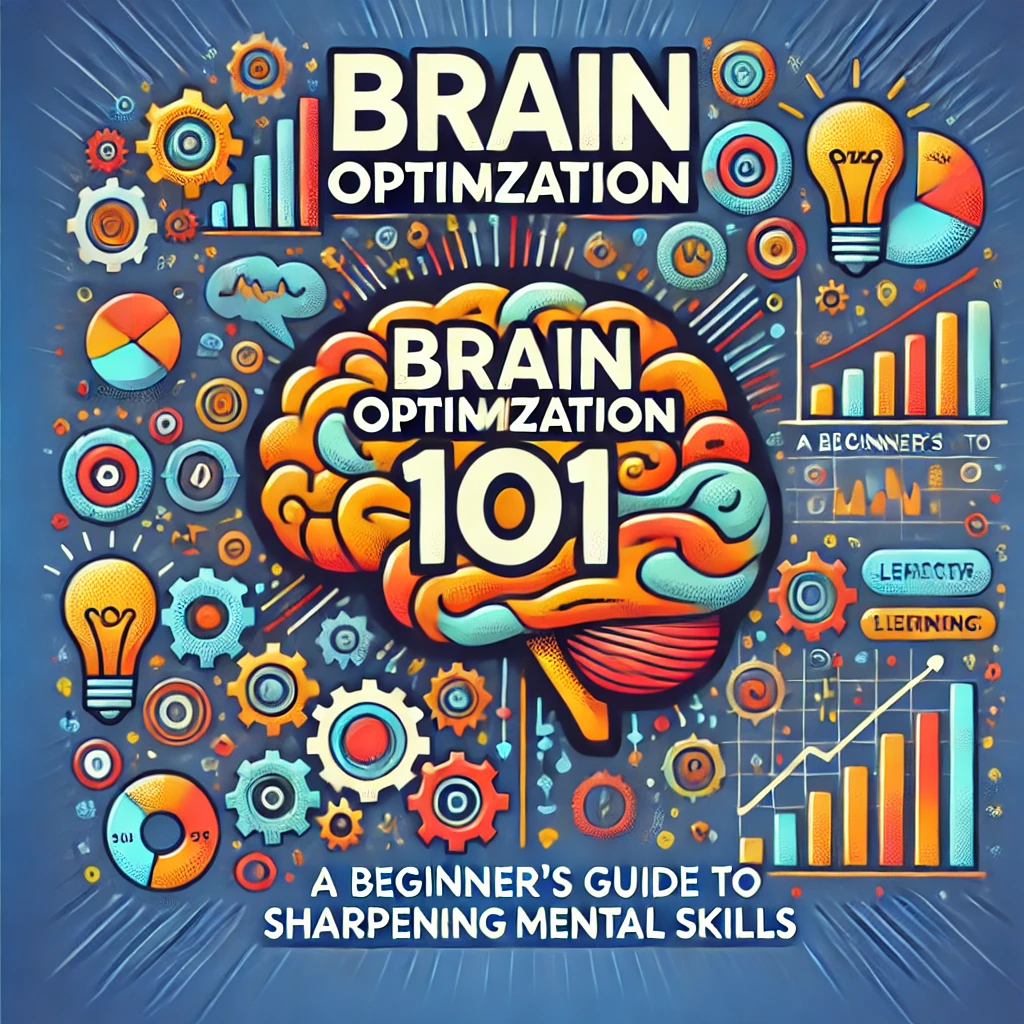Introduction
In today’s fast-paced world, a sharp mind can be one of your most powerful assets. From improved focus to enhanced problem-solving skills, brain optimization can help you perform better at work, school, and even in daily interactions. You don’t need to be a neuroscientist to start enhancing your brain’s potential; simple daily habits and exercises can make a huge difference in how you think, remember, and stay focused.
In this guide, we’ll cover the basics of brain optimization for beginners, with practical tips to improve cognitive abilities, boost mental clarity and focus, and enhance memory. So, let’s get started with your personal roadmap to a sharper mind!
1. Start with the Basics: Hydration and Nutrition
Before jumping into brain training exercises or mental skills enhancement, it’s important to address the foundation of brain health: hydration and nutrition. Your brain is 75% water, and even mild dehydration can lead to fatigue and poor concentration.
How to optimize brain function through hydration and nutrition:
- Stay Hydrated: Aim for about 8 glasses of water daily, and more if you’re physically active. Carry a water bottle as a reminder to stay hydrated.
- Fuel with Brain-Boosting Foods: Foods rich in omega-3s, antioxidants, and vitamins, like salmon, blueberries, and leafy greens, are known to support brain health.
- Limit Sugar and Processed Foods: High sugar intake can lead to brain fog and crashes. Opt for natural energy sources like fruits and whole grains.
Relatable anecdote:
I used to reach for sugary snacks during work breaks, thinking they’d give me a quick energy boost. But I noticed I’d feel sluggish shortly afterward. When I switched to snacks like nuts or a piece of fruit, my energy remained steady, and my focus lasted much longer.
Pro tip:
Start your day with a brain-boosting smoothie using ingredients like spinach, berries, and chia seeds. It’s an easy way to nourish your brain and start the day with energy.
2. Exercise Regularly to Boost Mental Clarity
Exercise isn’t just for your body; it’s also one of the best ways to improve brain power naturally. Physical activity increases blood flow to the brain, delivering oxygen and essential nutrients. Regular exercise has been shown to enhance focus, memory, and mental clarity.
Types of exercise to optimize brain health:
- Aerobic Activities: Running, biking, or dancing improves blood flow and has been linked to better cognitive function.
- Strength Training: Lifting weights or bodyweight exercises improve discipline and focus, which are essential mental skills.
- Mind-Body Exercises: Yoga and tai chi combine movement with mindfulness, reducing stress and enhancing cognitive flexibility.
Relatable anecdote:
A friend of mine started taking brisk walks during lunch breaks to clear her mind. She noticed that she returned to work feeling mentally refreshed and had an easier time tackling her afternoon tasks.
Pro tip:
Even just a 10-minute walk can make a noticeable difference in mental clarity and focus. Try taking a quick walk if you’re feeling mentally stuck or tired.
3. Get Quality Sleep for Better Memory and Focus
One of the most overlooked brain health tips for beginners is the importance of sleep. Sleep is when your brain consolidates memories, processes information, and recharges for the next day. Without adequate sleep, your cognitive abilities can suffer, impacting everything from focus to problem-solving.
How to improve cognitive skills with better sleep:
- Stick to a Sleep Schedule: Going to bed and waking up at the same time daily helps regulate your internal clock.
- Create a Relaxing Bedtime Routine: Avoid screens an hour before bed, and try activities like reading or meditating to help you wind down.
- Optimize Your Sleep Environment: Keep your bedroom cool, dark, and quiet to improve sleep quality.
Relatable anecdote:
I used to pull all-nighters before big projects, thinking it would help me get more done. But I realized that lack of sleep only made me less focused and more prone to mistakes. Now, I prioritize sleep before major tasks, and I’ve noticed a huge improvement in my mental clarity and productivity.
Pro tip:
If you struggle with falling asleep, try deep breathing exercises or progressive muscle relaxation. These techniques can help calm the mind and prepare your body for rest.
4. Challenge Your Brain with New Activities
The brain thrives on new challenges. Trying something unfamiliar, like learning a new language or picking up an instrument, stimulates the brain, building new neural connections that improve memory and cognitive flexibility. Brain training exercises for beginners can be both fun and effective.
Ways to challenge your brain:
- Learn a New Skill: Try something outside your comfort zone, like cooking a new cuisine or learning a musical instrument.
- Play Brain-Boosting Games: Crossword puzzles, Sudoku, and chess are excellent for building mental agility.
- Practice Mental Math: Try calculating numbers in your head instead of using a calculator. It’s a simple way to train your brain on the go.
Relatable anecdote:
A friend of mine started playing chess as a way to relax, but he quickly noticed that it improved his problem-solving skills in daily life. He felt more confident tackling complex projects, thanks to the strategic thinking he practiced in chess.
Pro tip:
Set aside 15 minutes each day for a brain-challenging activity, like a puzzle or a language app. Consistency is key to seeing progress in mental sharpness.
5. Practice Mindfulness for Enhanced Focus
Mindfulness is a powerful tool for sharpening mental skills. By practicing mindfulness, you train your brain to stay focused on the present, reducing distractions and increasing concentration. Studies show that regular mindfulness practice can lead to better memory, improved focus, and reduced stress.
Beginner-friendly mindfulness practices:
- Deep Breathing: Take a few minutes each day to focus on deep breathing, which calms the mind and body.
- Guided Meditation: Use apps like Headspace or Calm to start a meditation practice, even if it’s just five minutes a day.
- Body Scan: Mentally “scan” your body from head to toe, noticing any areas of tension. This exercise helps increase self-awareness and focus.
Relatable anecdote:
I used to get easily distracted, especially when I had a lot on my plate. After incorporating five minutes of mindfulness into my morning routine, I found it easier to stay focused and tackle tasks with a clearer mind.
Pro tip:
Start with just one minute of mindfulness a day and gradually increase. This makes it easier to build the habit without feeling overwhelmed.
6. Feed Your Brain with Lifelong Learning
One of the best ways to improve cognitive abilities is to embrace lifelong learning. Our brains thrive on new information and challenges. Whether it’s reading a book, taking an online course, or attending a workshop, continuous learning keeps your mind sharp and adaptable.
Ideas for lifelong learning:
- Read Books on Varied Topics: Expand your knowledge by reading about subjects outside your usual interests.
- Take an Online Course: Websites like Coursera and Skillshare offer courses in everything from psychology to digital marketing.
- Join a Book Club or Discussion Group: Engaging with others who share different perspectives can stimulate your thinking and broaden your horizons.
Relatable anecdote:
I started listening to educational podcasts on my commute, and I was surprised by how much I learned just from those short sessions. Not only did it expand my knowledge, but it also kept my brain engaged and curious.
Pro tip:
Make a habit of learning something new each week, even if it’s a small fact or skill. Over time, this practice can greatly enhance your cognitive flexibility.
7. Train Your Memory with Visualization Techniques
Visualization is a powerful method to enhance memory. By creating mental images of the information you’re trying to remember, you activate different areas of the brain, making it easier to recall details later. This technique is particularly helpful for beginners looking to boost mental clarity and focus.
Simple visualization techniques:
- Create Mental Pictures: When you need to remember a list, try creating a vivid mental picture for each item.
- Use the “Memory Palace” Method: Visualize a familiar place (like your home) and mentally place items you want to remember in different “rooms.”
- Connect Ideas with Images: If you’re trying to memorize a concept, associate it with a specific image to make it more memorable.
Example:
When trying to remember someone’s name, I visualize an object that reminds me of their name. This simple technique has made it much easier to remember names, which used to be a struggle for me.
Pro tip:
Practice visualization techniques daily, even with simple tasks. For example, try visualizing your to-do list as a series of images in your mind.
8. Strengthen Focus with the Pomodoro Technique
The Pomodoro Technique is a time management method that helps maintain focus and prevent mental fatigue. By working in short, focused intervals, you can train your brain to concentrate more effectively and complete tasks without getting overwhelmed.
How to use the Pomodoro Technique:
- Set a Timer for 25 Minutes: Focus on one task for 25 minutes without distractions.
- Take a 5-Minute Break: After 25 minutes, take a short break to recharge.
- Repeat: After four cycles, take a longer break of 15–30 minutes.
Relatable anecdote:
A friend introduced me to the Pomodoro Technique, and it
transformed how I work. Breaking tasks into small intervals helped me stay focused and avoid burnout, especially on busy days.
Pro tip:
Use an app like Focus Keeper to easily track your Pomodoro intervals and break times.
9. Embrace Positivity for Cognitive Health
Positive thinking isn’t just a feel-good concept; it can also benefit brain health. Studies suggest that positive thinking reduces stress, which can improve cognitive function and mental resilience. Maintaining a positive outlook can help you tackle challenges with a sharper mind.
Ways to cultivate positivity:
- Practice Gratitude: Write down three things you’re grateful for each day, which shifts your focus to the positives.
- Challenge Negative Thoughts: When negative thoughts arise, question their validity and try to reframe them in a positive light.
- Surround Yourself with Positivity: Spend time with positive, supportive people who lift you up.
Relatable anecdote:
Whenever I start my day by listing what I’m grateful for, I feel more optimistic and focused throughout the day. This small practice has made a noticeable difference in my mental clarity.
Conclusion
Optimizing your brain doesn’t require drastic changes. By incorporating small, consistent habits—like drinking enough water, exercising regularly, practicing mindfulness, and challenging your brain with new skills—you can make a big difference in your cognitive abilities. This beginner’s guide to brain power is designed to help you start your journey toward a sharper, more focused mind.
Remember, brain optimization is a marathon, not a sprint. Begin with one or two of these practices, and gradually add more as you progress. With time and dedication, you’ll notice improvements in mental clarity, focus, and overall cognitive resilience.
FAQ Section
1. How can I improve focus and memory?
Hydration, balanced nutrition, regular exercise, and brain training exercises like visualization can improve focus and memory.
2. What is the best way to start brain optimization for beginners?
Start with basic habits like staying hydrated, getting enough sleep, and challenging your brain with new activities.
3. Can exercise help with brain health?
Yes, physical activity improves blood flow to the brain, supporting mental clarity, focus, and memory.
4. How does mindfulness enhance cognitive abilities?
Mindfulness reduces stress and increases focus, helping improve cognitive function and mental clarity.
5. Is sleep really important for brain function?
Absolutely, sleep is essential for memory consolidation, mental clarity, and overall cognitive performance.
6. How can I make learning a lifelong habit?
Read regularly, try new activities, and engage in discussions with others to keep your brain engaged and learning.
7. What foods are best for brain health?
Omega-3-rich foods, antioxidants, and fiber from sources like fish, berries, and leafy greens support brain health.
8. Can positive thinking improve brain power?
Yes, positivity reduces stress and enhances resilience, which supports cognitive health and mental focus.
9. What’s the easiest way to start practicing mindfulness?
Begin with a few minutes of deep breathing each day, or try guided meditation to build your mindfulness practice gradually.



